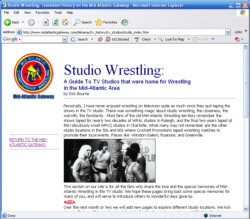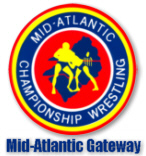|

RETURN TO THE STUDIO WRESTLING INDEX
RETURN TO THE MID-ATLANTIC GATEWAY
WBTV STUDIO WRESTLING
WRAL STUDIO WRESTLING
TV WRESTLING
HISTORY
|
|
MEDIA FLASHBACK:
PRO WRESTLING ENDURES, PROSPERS
WEEKLY ON TV
By Mark Wolf - The Charlotte Observer, March 25, 1978
Crunch. Slam. Piledrive. Thud. Smack. Kick. “You turkey neck.”
Sleeper. Pin. Professional wrestling is on the air.
The cast changes, heroes and villains arrive and depart, the belts,
symbolic of myriad championships, change hands and the sport itself
is given the back of the sports establishment’s hand. But televised
professional wrestling endures; no, it prospers.
Consider. Except for local news, Mid-Atlantic Championship Wrestling
is the longest running show on Charlotte’s Channel 3 (WBTV).
“It’s been on at least close to 20 years,” says John Edgerton, WBTV
managing director. “I’ve been here since 1957 and I can’t remember
when it started. The records probably don’t go back that far.”
(Gateway Note: it was Jan. 11th, 1958).
The one-hour show, which airs Saturday afternoon on Channel 3 (the
time varies) was watched in 63,000 households during a recent
ratings period. A similar show, Wide World Wrestling, is shown at
noon Saturdays on Channel 36 (WRET) and drew 43,000 households in
the same period.
“It probably enjoys the longest continuing run of any program on
television,” says WRET station manager, Dave Uhrich. “I can’t think
of any other syndicated show that’s been on that long except maybe
some religious show.”
Charlotte promoter Jim Crockett produces and packages both programs
and provides them free to the Charlotte stations and 22 other
stations in North and South Carolina and Virginia. Crockett gives
the show away in return for commercial time during the broadcasts to
promote the live wrestling shows he stages in the three states. He
also sells the show to stations in West Virginia, Georgia, Texas,
Florida, Pennsylvania, Michigan and Kansas.
The wrestling show is an everybody wins situation. Crockett gets an
hour’s promotion for his arena shows, and the stations get not only
free programming, but can sell commercials during the show.
“Because television is seasonal, there are not commercials in all of
the slots that are available,” says
WBTV program director
John Hutchinson. “Actually, we have movies we could make more money
from, but we have a need for a wrestling program. The ratings are
very good. If we weren’t getting that particular show, we would go
out and look for another one.”
“It (wrestling) appeals to so many different levels. The nostalgia
of people who watched it when they were kids, the morality play
element of good against bad, the football fan who likes to sit in
his armchair and work out his aggressions, older people, kids, it
cuts across all strata. With everything else changing in society,
wrestling has always been popular on TV. There’s something going on
there, something that taps a need in a lot of different people.”
According to Crockett, the show outdraws Wide World of Sports, NCAA
Football and NCAA Basketball. “In Greenville, SC, we delivered more
adult males than ‘Starsky and Hutch’ or ‘Kojak’, and they’re in
prime time.”
Crockett’s shows, produced before a live audience every Wednesday
night in the Raleigh studios of
WRAL-TV, are
technically proficient and include slow-motion replays of winning
maneuvers. (“Let’s have another look at that figure four leglock,
Bob.”)
Bob Caudle, now a WRAL salesman, formerly an on-air personality, and
Crockett’s brother, David, announce the Mid-Atlantic (Channel 3)
program. Former wrestler George Scott hosts the Wide World (Channel
36) version with a guest commentator – usually a wrestler, but
occasionally Jim Crockett. (“Boy, do I hate doing that,” says
Crockett.)
The same corps of wrestlers appear on each show. The format includes
four or five matches interspersed with interviews. The interviews
afford the wrestlers an opportunity to develop their personalities,
bad-mouth upcoming opponents, and hype the next live show.
Interviews promoting matches in each market area are spliced into
the tape which goes to the station in that market.
Generally, a headline wrestler (Ric Flair, Greg Valentine, Wahoo
McDaniel, Ricky Steamboat, or the like) opposes a lesser light.
Occasionally, though, Crockett matches a pair of headliners.
Recently, Valentine captured the Mid-Atlantic championship from
McDaniel on TV and broke Wahoo’s leg in the process.
Whether wrestling is real, semi-real or a complete sham is beside
the point (says Crockett). “I don’t believe anybody has ever been
able to go to one of our matches and walk away and say it’s fake.”
At its best, wrestling is akin to a superb magic act. It works to
the extent that the audience wants it to. Just like the old Mets
slogan, “You’ve gotta believe.”
- Mark Wolf - The Charlotte Observer, March 25, 1978

STUDIO
WRESTLING INDEX | ALMANAC INDEX
| GATEWAY HOME PAGE
|


